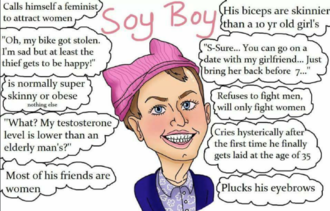Soyboy
Soyboy (also spelled soy boy, soi-boi, or other variants) is a term used by masculinists to disparage someone for not being masculine enough. The use of the word "soy" in this sense implies that the man in question has possibly been feminized by consuming a lot of soy products. This stereotype partly derives from the fact that soy contains compounds that weakly mimic the effects of estrogen, known as isoflavones, combined with observations of the effeminate physical traits of certain men who consume soy products.
This is the opposite of the stereotype of "real men eat meat". Food products containing soy are popular among vegetarians and vegans as soy is high in protein and has a much higher protein quality than most plant foods. This impression of plant eating men as less masculine is possibly a carryover of deep social history where the most proficient hunters brought home the game and had higher ranking of choice not only of the meat available to the tribe, but of females. Hunting required strength and prowess. The male gatherers of a tribe in most cultures were seen as low class, often the elderly and infirm.[citation needed] Moreover, the most successful hunters could typically best attract women and had more offspring, even in the most egalitarian hunter-gatherers like the Ache and the Sharanahua.[1]
Not all incels or even incel forums use the term soyboy or agree with underlying assumptions about masculinity/feminity.
The term has wide usage outside of the forums mentioned in this wiki.
Representations of soyboys[edit | edit source]
The stereotypical image of a soyboy is a man with a beard and glasses opening his mouth and eyes wide-open and in a, "surprise!", face during pictures that is also known as the Soylent Grin. This meme came from casual analysis of the facial expressions of male feminist video gamers and college student types, and was deemed to be a sign of submissiveness and femininity. This is similar to the 'fear grin' used by chimpanzees as a sign of submission to the chimps above them in the social dominance hierarchy, it can also often be seen performed by females attempting to be seen as 'zany' or 'quirky' when being photographed.
On masculinity[edit | edit source]
In a bad academic paper on incels and this wiki it says:
Delicate masculinity seems to play a major role in how the movement has been created and is growing. Many members do not feel secure in their masculinity leading to the expression of aggression. This can probably also contribute to the strong female hatred that often expresses itself on the side because one part of hegemonic masculinity is to reject the feminine.
While this is true for some incels, a better way to explain this would be that there is a split between masculinist and non-masculinist incels. For masculinist incels, a departure from hegemonic masculinity is a bad thing, and there may be some projected self-loathing. For non-masculinist incels, they do not feel bad personally departing from hegemonic masculinity and their hatred instead comes from women not liking feminine men.
Feminization due to soy phytoestrogens[edit | edit source]
It has been suggested vegetable foods with estrogen-like constituents (phytoestrogens) like nuts and oilseeds, soy products, cereals, breads, and legumes contribute to male feminization, which gave rise to the soyboy meme. However, a 2010 meta-study of found that soy foods did not alter measures of bioavailable testosterone concentrations in men.[2] As phytoestrogens compete for the same receptors as your natural estrogen but are weaker agonists of those receptors, it is actually possible that consuming soy products effectively reduces estrogenicity in the body. This reduction of estrogenicity is likely why soy is moderately protective against breast cancer in women, as estrogen can stimulate the growth of cancerous breast cells.[3]
